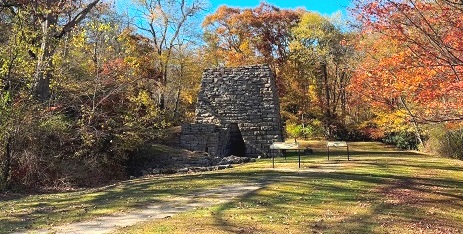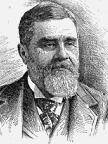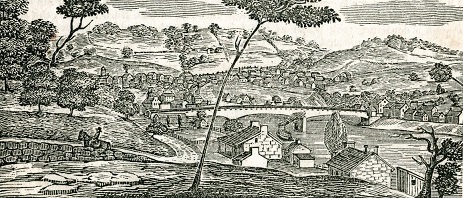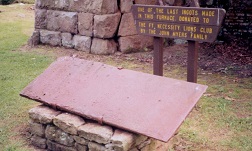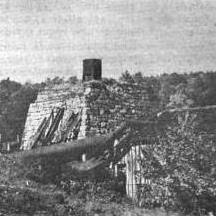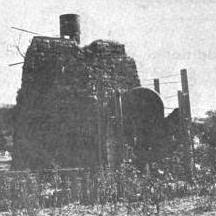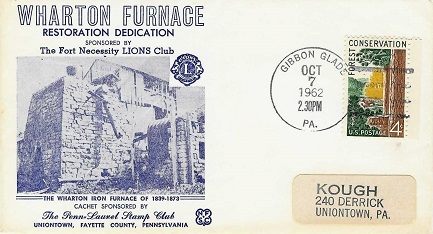| Home |

|
James
Minerd Sr. |
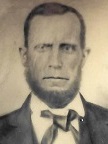 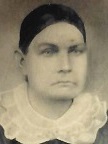 |
James and Sarah Minerd |
James Minerd Sr. was born in 1815 in Fayette County, PA, one of 15 children of Henry and Hester (Sisler) Minerd.
He was one of the earliest coal miners and iron-industry laborers in our clan.
In the mid-1830s, James was united in the bonds of holy matrimony Sarah Walters (July 1821-1901). The names of her parents are not yet known.
The couple together produced a brood of 11 children -- Minerva Inks, James Minerd Jr., William Minerd, Hester Ann Rankin, Isaac F. Minerd, Calvin Minerd Sr., Mary Whetzel, Mariah Jane Whetzel, Sarah "Emily" Smith, Morris Minerd and Margaret A. "Maggie" Minerd. The fate of daughter Maggie is unknown.
Sarah gave birth to their eldest daughter in 1837, at the tender age of 16, and to their youngest in 1865, at the age of 44. At the time the children were born, no public records were kept, and there were no church or pastoral records of these events. Son Isaac once testified that "the family Bible or family record, in which the births & deaths of the family was recorded, was destroyed about [1888]."
The Minerds received their mail over the years at Farmington, Wharton Furnace and Chalk Hill, with James and some of his brothers and sons laboring at the well-known Wharton Furnace.
~ Life and Work at Wharton Furnace ~
|
|
|
Wharton Furnace ruins, 2025 |
|
Furnace owner Andrew Stewart History of Fayette County, 1882 |
The furnace property was listed in the 1858 book, Geology of Pennsylvania, which reported a coal bed of four feet thickness, lying 20 feet below a band of iron ore. Both the coal and the ore were valuable commodities.
The Minerds are believed to have resided there in employee housing, and at least three sons are known to have been born there -- twins James Jr. and William in 1840 and Isaac F. in 1847 -- along with niece Barbara Ellen (Minerd) Firestone in 1853 and nephew Howard Minerd in 1850. The wedding of James' sister Mary Ann to John Devan was conducted at the furnace in 1841, and cousin Joseph Hall and his sons David and Samuel also worked at the site.
The furnace stayed in business off and on over the decades. Among its early managers were Alfred Stewart, Edward Hughes, J. Kennedy Duncan and D.S. Stewart (1852-1856). It was blown out in 1856 and remained idled until 1858, with laborers such as the Minerds forced to find other sources of income. The Worthington & Snyder partnership took over management in 1858. The federal census enumeration of 1860 lists James as a coal miner.
During the Civil War, the furnace is believed to have produced iron for Union Army cannonballs, but this must not have been profitable. Later in the month that Gen. William Tecumseh Sherman's troops captured Atlanta, the Pittsburgh Post-Gazette of Sept. 28, 1864 advertised the property for sale or rent, containing 3,000 acres of land and from 25 to 30 houses as well as five improved farms.
With his sons as helpers, James is said to have driven six-mule teams and hauled iron ingots (and possibly cannonballs) along the National Highway through Uniontown and thence westward to the river town of Brownsville, Fayette County, PA, where the product was shipped by river to Pittsburgh's teeming mills. It's believed that James' brothers Daniel, Samuel and John also labored at the furnace, burning charcoal and hauling iron.
|
W. Dewees Wood Courtesy Google Books |
By 1869, after another $20,000 investment by Wood & Lukens, the furnace was "blowing with four tweers [sic], making, we understand, from ten to twelve tons of iron per day," said the Commercial. "Their coal banks, coke ovens and part of their ore banks are all within a stone's throw of the furnace stack. They are now using a small portion of Lake Superior ore, which is said to increase the quantity and improve the quality of the iron."
Later that spring, with A. Hayden employed as on-site superintendent, the furnace advertised that it wanted to hire 20 coal diggers. By the first week of June, however, the furnace had gone out of blast, and again was advertised for sale. An advertisement in the Sept. 8, 1869 edition of the Bulletin of the American Iron and Steel Association said that the facility consisted of a hot blast charcoal furnace, in complete repair, of which the hot blast and blowing apparatus was entirely new.
A year later, in 1870, a two-feet-thick vein of Johnstown ore was discovered near the site which gave its prospects another breath of life. A visitor to the site in 1870 wrote in the Bedford County Press that "The roads for some distance, have been made very disagreeable to the pedestrian, by the rasping refuse from the furnace. The timber has been cut away for miles around, to furnish charcoal for smelting the iron, and there is now a young growth instead, so thick as to make it almost impenetrable to man or beast."
|
|
| Sketch of Brownsville as seen from the National Turnpike, 1843, a view James and his brothers would have known when hauling iron ingots from the Wharton Furnace. Below: carte de visite image of Sarah, photographed at the Lingo Studio in the county seat of Uniontown - courtesy Debra (Minerd) Kemp |
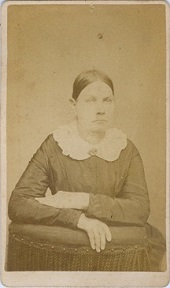 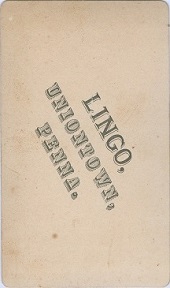 |
One of the problems with operating the plant was its remoteness in the mountains. "Ore and coal are plenty, but the distance, over bad roads, to haul the metal is the great trouble in running the Wharton Furnace," said Franklin Ellis' 1882 History of Fayette County. It also was costly to send wagons of ingot all the way through Uniontown and along the National Highway to Brownsville.
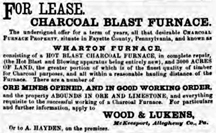
Lukens retired from his partnership in the Wood & Lukens firm in 1871. George W. Paull then leased the site in the winter of 1871 with plans to manufacture charcoal iron suitable for car wheels, and hired a team of woodchoppers to cut up wood for charcoal.
It was about this time that Daniel's brother Samuel bought the Fayette Springs resort less than two miles away and along the short road leading uphill to the National Highway. A correspondent for the Pittsburgh Weekly Gazette visited the resort in July 1871, writing:
[In] coming up Laurel Hill I learned from my hero Pirrip that the Springs could be reached via the furnace without much inconvenience. This furnace is owned by the Hon. Andrew Stewart and is at present operated by Messrs. Paull & Mitchell. It is in full blast and turns out a large quantity per day of first-rate metal. The metal is hauled in wagons to Uniontown, a distance of seven miles, thence carried by rail to Pittsburgh. The mountain region hereabouts is a very pleasant locality in which to spend the hot summer days, and I observe a number of Pittsburghers here enjoying themselves quite satisfactorily.
Stewart changed management of the furnace in 1872, leasing it to a group including Edmund C. Pechin (president of the Dunbar Iron Company), Maurice Healy, C.E. Swearingen, Arch P. Mitchell, John McLeary and A.W. Bliss. They changed the name of the site from "Wharton Furnace" to the "Stewart Furnace Company" in honor of its owner. A report in the Pittsburgh Weekly Gazette said that the new strategy would be to "blow their furnace on coke and [they] are confident they can produce from ten to twelve tons per diem." Pechin was to serve as general manager, Trealy superintendent of the furnace, McLeary the mines, Swearingen the store and Mitchell the accounts and outside business. But they could only make a go it for about six months.
|
Iron ingot from the Furnace
|
In McKeesport, Lukens continued to run his iron mill for several more decades "with almost unheard of success," said the Pittsburgh Post. He sold it in about 1899 to the American Sheet Steel Company which in turn was acquired in the formation of United States Steel Corporation.
Many years later, in July 1918, the Minerds' aged son Isaac returned to the family's old residence for a birthday picnic thrown by his niece Mary (Williams) Morrow and her husband. Reported the Courier, "the picnic was held at the Wharton Furnace, near the Summit, the old home and birthplace of Mr. Minerd. The house in which he resided is torn down, but a part of the old furnace and the orchard are still there. The apple trees are laden with fruit. A most enjoyable day was spent by all present."
In 1961, the Fort Necessity Lions Club and Historical Society of Western Pennsylvania together pursued fundraising to restore the furnace's "work arch." The furnace was repaired in 1962 by the Pennsylvania Bureau of Forestry, with the surrounding area cleared for use as a small public park. According to a July 1965 article in the Historical Society's Western Pennsylvania Historical Magazine, "A Guide to the Old Stone Blast Furnaces in Western Pennsylvania, Part III," "The stack is to be kept as a memorial example to the iron industry which played an important part in the early history of Fayette County." Then in 1991, the furnace was listed on the National Register of Historic Places. Great-great-great grandson Robert Arnold McDowell -- of the family of Charles Widdup and Etta (Minerd) McDowell -- included a brief discussion of the property in his self-published masters thesis, entitled Stone Iron Furnaces of Fayette County, Pennsylvania.
One of the last ingots produced at the furnace, seen here, today is on display at the site. It was donated to the Fort Necessity Lions Club by the family of John Myers.
|
|
| Above: Furnace ruins in 1905 (American Manufacturer and Iron World, July 6, 1905). Below: restoration in 1962 by the Fort Necessity Lions Club |
|
|
~ The Minerds' Later Years ~
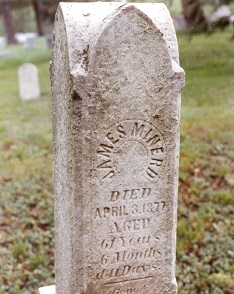 |
Hopwood Cemetery |
During the Civil War, from 1861 to 1865, the Minerds were without the help of three sons and one son-in-law, who served in the Union Army. Three returned home with wounds.
Little is known about Sarah, although according to her obituary, she "was always a devout member of the Methodist Episcopal Church."
When the federal census was taken in 1870, James and Sarah made their home at Chalk Hill, Fayette County, also known at the time as Fayette Springs. James' occupation was recorded as farmer. At age 54, he still had many mouths to feed, as Sarah and their children Calvin, Emily, Morris and Maggie were still living under their roof. Their next-door neighbors that year were James' step-cousin Eli and Catherine (Dean) Leonard, also farmers.
In 1873, James filed a lawsuit against his former employers, the business partners of Wharton Furnace, known at this time as "Stewart Furnace Company" -- Edward C. Pechin, Maurice Haley (or "Healy"), John McCleavey and J.H. Bramwell. He was seeking relief over over an unpaid $114.75 debt. The outcome of the case is unknown.
James died on April 3, 1877, at the age of 61 years, six months and 11 days. The cause of his passing is not yet known. He is buried at Hopwood Cemetery under a still-legible pylon marker, seen here, near the grave of his father. At the time, the youngest of his children was age 12.
Sarah survived
James by nearly a quarter of a century. Her whereabout in 1880, at the time of the federal census enumeration, has not yet been found.
In
1900, she was living in the residence of her eldest daughter Minerva Inks
in Wharton Township.
She died on Feb. 10, 1901, at Juniataville, a coal mining patch town between Connellsville and Uniontown, Fayette County. Her passing was caused by "general debility, the result of old age..., having been ill for two years," said a local newspaper. Her burial site is unknown, but is believed to be with or near James at Hopwood.
|
Copyright © 2000-2005, 2009, 2011, 2023, 2025 Mark A. Miner |
| Wharton Furnace ad from the AISA Journal courtesy of Google Books |
